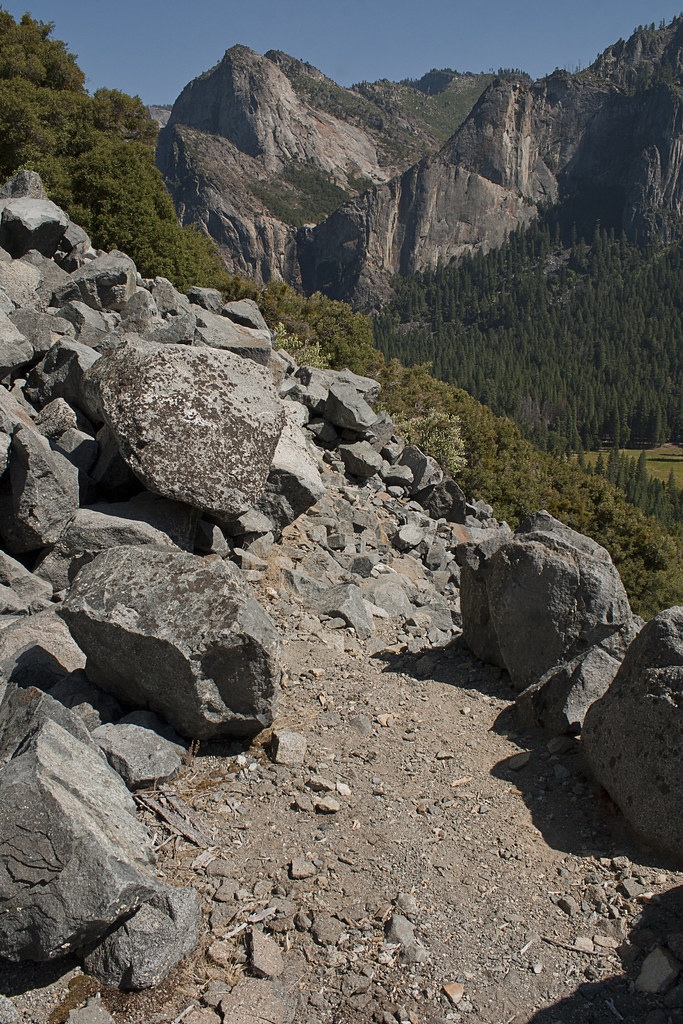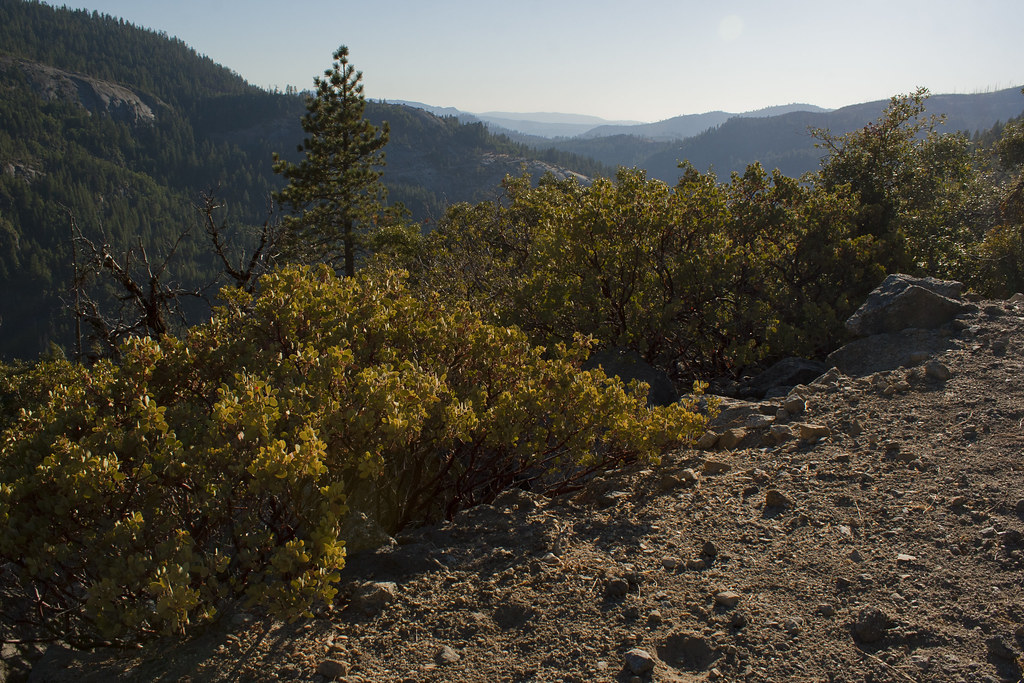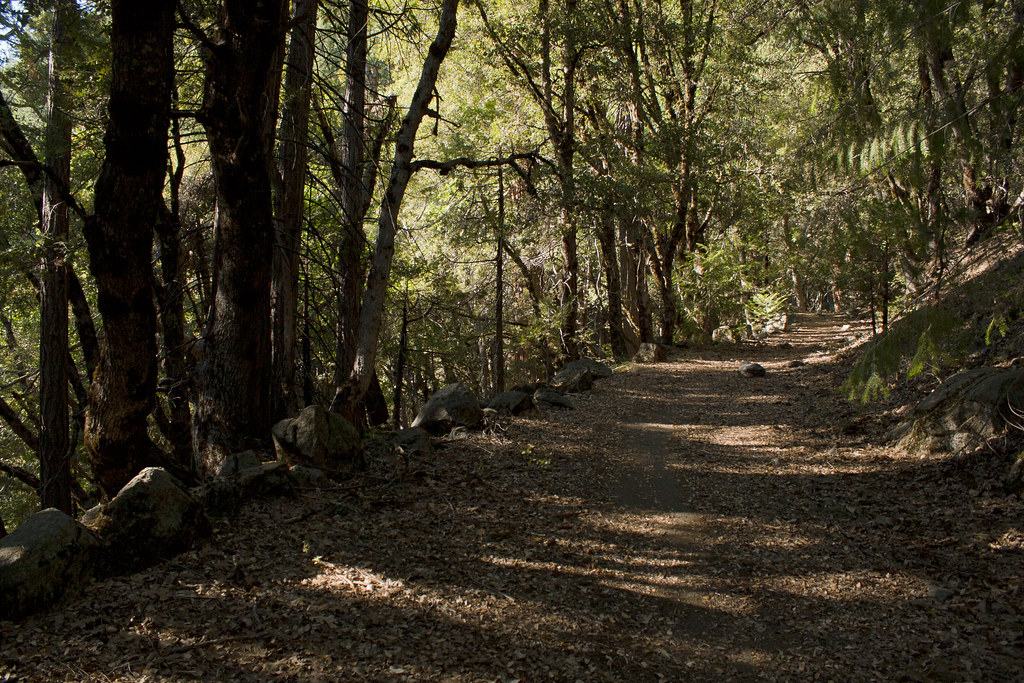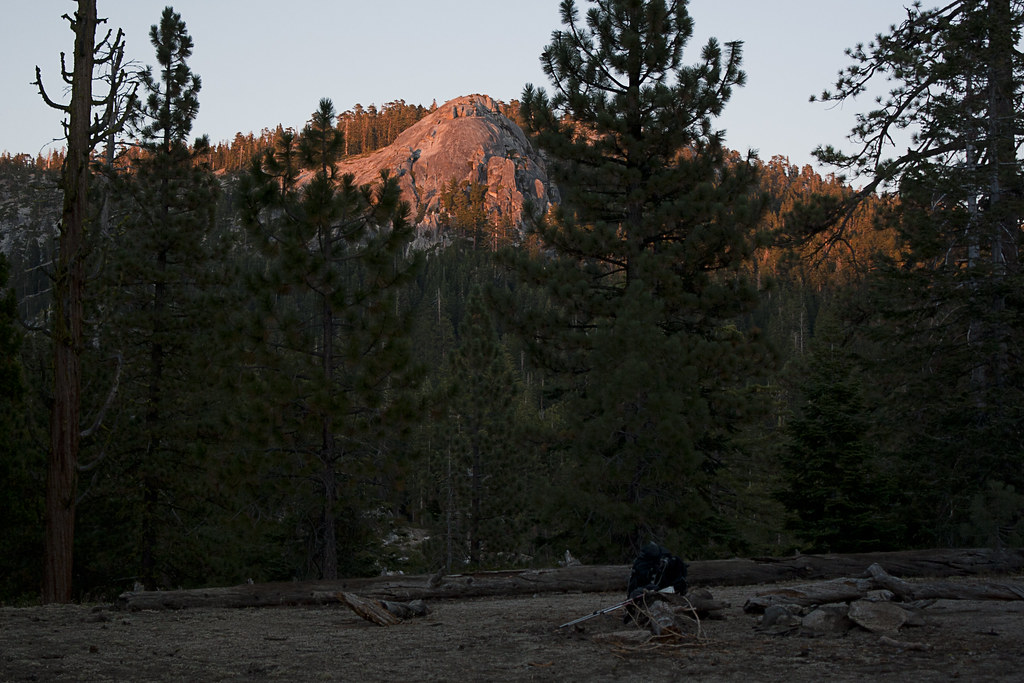Yosemite, Part Four<br><font size="2"> - Number 26 on my life list.</font>
For three miles, I climbed over the boulders and fallen trees that covered the old vanishing road. I moved like a chameleon crawling along branches, each careful step verified before going forward. A fall here could have made the rest of my trip quite difficult. I suppose a fall here could have made staying alive quite difficult.
After stepping from one boulder to another, my camera was unleashed from the cord holding it against my pack’s shoulder strap. It swung from the strap around my neck and banged into my arm. I watched my lens cap pop off and fall between a pile of large stones and out of sight. For a moment, the gentle breeze was accompanied by hushed expletives.
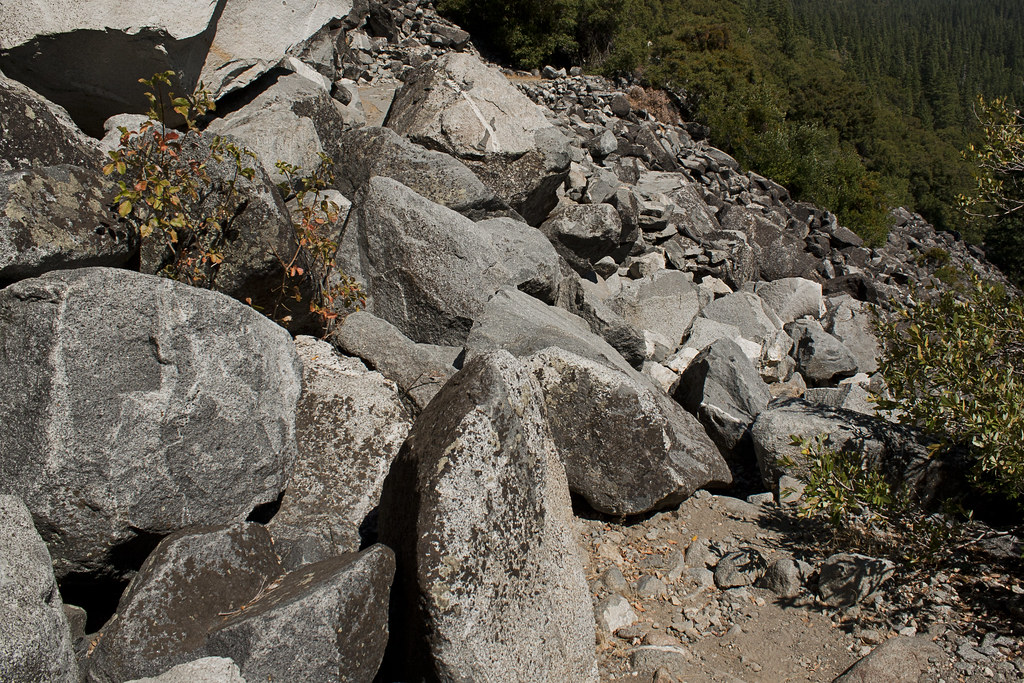
I had no intentions of leaving the only lens I brought unprotected. I laid face down over one of the boulders, so I could reach for the lens cap. “No snakes, no snakes, no snakes,” I willed as I blindly stretched my arm in. When it comes to things I want to avoid on a solo backpacking trip, not taking photos rates only slightly worse than a venomous snake bite. Luckily, I felt the cap instantly and retrieved it. I blew off the dirt, secured it to my camera, and devised a way to make sure that would not happen again.
After traversing the final rockslide, the trail dead-ended into a thicket of trees, shrubs, and thorned bushes. I looked up a scree slope to my right. A scree slope is an accumulation of broken rock fragments sometimes found at the base of mountains and cliffs. The pieces ranged in size from coarse sand to pea gravel, mixed with larger jagged rocks.
“It’s not that bad, only about sixty feet,” the ranger said this morning regarding how far I'd need to climb to reconnect with the trail. He didn’t say it was a scree slope, but this had to be it. I put my camera in my pack. I didn’t get photos of this area, but I would need to bushwhack and use all fours to make it up.
With every two or three feet I went up, I slid down one, like climbing a mound of gravel at a quarry. About a quarter of the way up, it got much steeper. Disturbing images of falling down the hill and rolling over jagged shards of granite, entered my mind, followed by the desperate descent back to civilization that would follow. I stopped to look for cairns, flat stacked rocks that mark a trail. The ranger said I would see some. I saw nothing; no trail, no road, no cairns. I eased back to the bottom, mostly by sliding on my butt.
I paced back and forth along the trail looking for a safer way up. At the dead-end's side of the scree slop there was foliage growing through the gravel. I worked my way up grabbing shrubs and thorn bushes for support. I got further than before, but got stopped at another obstacle that seemed too risky, considering the ranger’s insistence that it wouldn't be that difficult. I was getting frustrated. I went back down for one last futile attempt to find cairns, but gave up and went back the way I just came.
Every move was cautiously considered. I grabbed rock ledges with nervous, sweaty hands. My knuckles turned white when gripping plant stems and tree branches. Trekking poles were nearly useless in the gravel, but worked well when holding them horizontally behind a pair of tree trunks and grasping them like ladder rungs. At this point, it was more dangerous to turn back than it was to go forward, so I pressed on.
I chose my route based on the next thing I could grab. This inadvertently led me to an area on the hill that, if I were to fall and slide to the bottom, would give me a few hundred foot free fall to look forward to. My rising blood pressure swelled the ugly veins on my forehead. Each footstep sent pebbles rolling down the hill. I heard them falling over the edge. Then falling. Then falling. A rather disturbing sound.
I spotted Manzanita shrubs up ahead. I sold Manzanita branches in my pet store for parrot perches and recognized their smooth twisting trunks and branches instantly. The wood is too hard for large parrots to easily destroy with their powerful beaks. I never thought that information would come in handy again, especially for this reason.
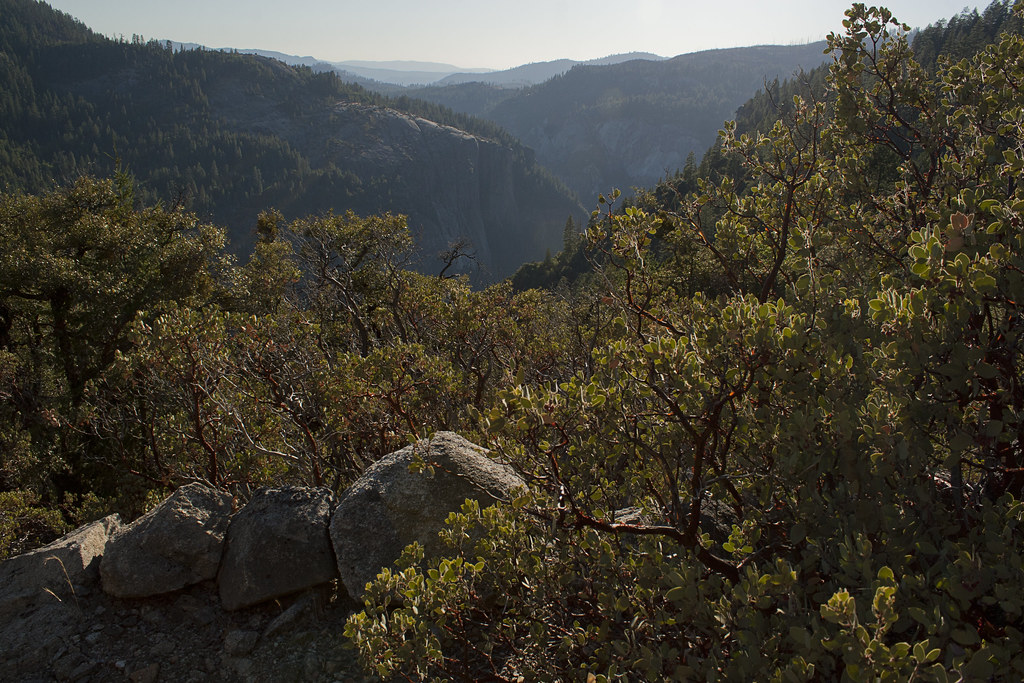 I crawled on hands and knees while grasping them for support. They were indeed strong enough. Their contorted branches scratched red lines into my face and arms, but I didn’t care dammit, I was getting up this hill!
I crawled on hands and knees while grasping them for support. They were indeed strong enough. Their contorted branches scratched red lines into my face and arms, but I didn’t care dammit, I was getting up this hill!
The lower branches pushed at my forty pound humpback and forced me to lay flat to finish my climb. I felt like I was in boot camp crawling under barbed wire, only I was on a gravely hill that ended with a deadly drop.
I want to believe that in a parallel universe, there is a Ryan that didn’t open a pet store, a smarter Ryan perhaps, but nonetheless a Ryan with no knowledge of the tensile strength of the Manzanita branches. Maybe this other Ryan would have chosen a different path up this hill and fell to his death. I want to believe that because it would validate my decision to waste my early to mid-twenties running a pet store.
Wishful thinking maybe, but after spending four years cleaning animal shit every day, who wouldn’t want to believe that it would one day save their life in Yosemite National Park?
While still crawling on the ground, grasping at the branches, I looked up and saw a rock wall that had once supported a side of the old road. I was able to get to my feet, over the wall, and back on track. It was easily the most nerve-racking moment I’ve ever had on a hike, but I made it. I wanted to get on hands and knees to kiss the trail, French kiss it even. I was that happy. But instead, I took off my pack and had lunch.
The road was more intact up here. A long section curved into a tunnel of trees, without a single rockslide blocking my path. The traffic has been gone for decades, but I imagined the road in its glory days. Open carriages and Model Ts coming around the bend, passengers leaning out to point at the view. For some reason, I could only imagine this in black-and-white, running at the wrong speed, and accompanied by honky-tonk piano music.
Fade to today and it’s a dilapidated overgrown stretch of road, no longer on maps. A man is sitting alone in the middle of it, crunching on crackers and turkey pepperoni, minding his own business.
Somewhere in the trees, a branch cracked. I turned to see what it was. The leaves rustled. The heavy footsteps of a large animal fled into the woods, fracturing more sticks as it ran. I didn’t see anything, but I thought it sounded more like a bear than a deer.
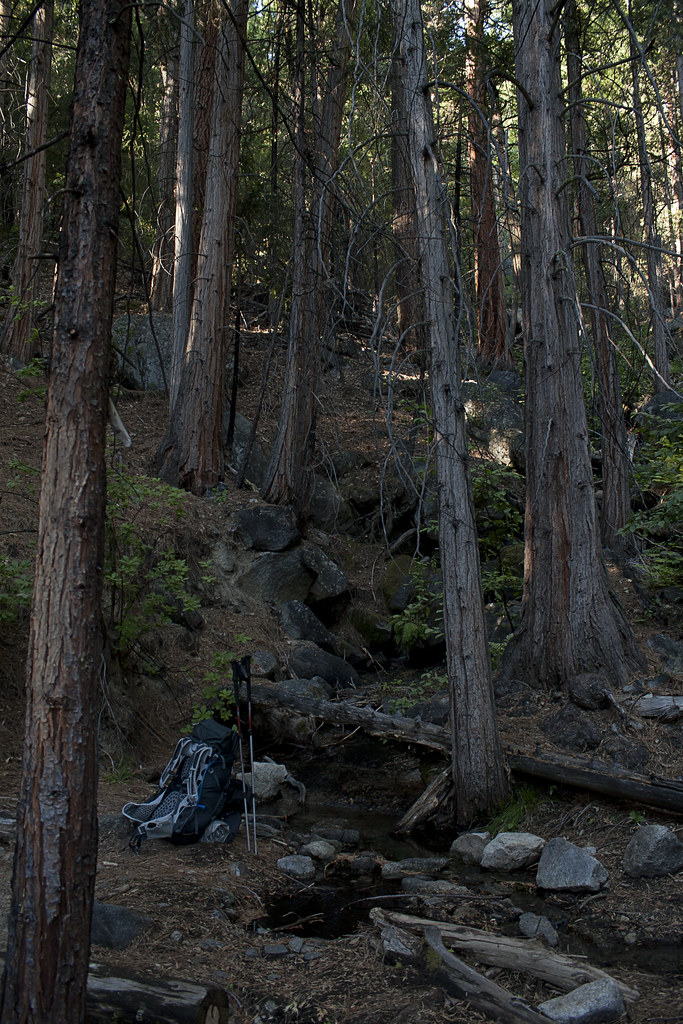 “Rainy days and Monday’s allll-ways get me-eee dowwwwn!” Probably too late for that, but I sang the chorus anyway, and made myself laugh out loud.
“Rainy days and Monday’s allll-ways get me-eee dowwwwn!” Probably too late for that, but I sang the chorus anyway, and made myself laugh out loud.
It wasn’t until I stopped for water that I realized there wasn’t much daylight left. I searched for a good place to setup camp while I hiked up another mile. The trail curled around a hill that I suspected would have a good place to setup camp on top. I wore myself out rushing uphill to secure my place to sleep before nightfall.
The top was a rocky plateau with few trees, perfect for viewing the stars. A scorched ring of stones lay in the middle for a fire. I slid out of my backpack and stretched my shoulders. After removing that burdensome weight, the feeling in my legs gives me a sense that I could jump on top of buildings. I leaped into the air, probably twelve inches off the ground, but for a brief moment felt like Superman.
I surveyed the area and chose a place to pitch my tent. I moved a few sticks, logs, and dry pine needles next to the fire ring to use later. Within a few minutes I had fire crackling and ate a small meal. The sun, that I thought would be gone before I setup camp, seemed to wait until I was finished before heading in for the night. The Milky Way splashed a celestial river across the dark sky.
The sky at Yosemite isn’t the darkest I’ve seen (that award still goes to Isle Royale), but sixty percent of Americans can’t even see the Milky Way due to light pollution. I gazed at the sky and wondered why we bother to light up the night. Especially in small towns, like back home, that more or less close by 6 PM. The night lights have not been shown to reduce crime, nor have they been as effective at reducing car accidents as reflective lane markers. My assumption for why we do this reminded me of something I mentioned before.
“But, what about bears?” Maybe it’s just another irrational fear. Nyctophobia, fear of the dark. I'm certainly not without my own fears, but I’m convinced that an important first step to living an interesting life is learning to accurately assess risk. If nothing else, maybe doing so will convince us to bring back one of the most beautiful things any of us will ever see: a truly dark sky.
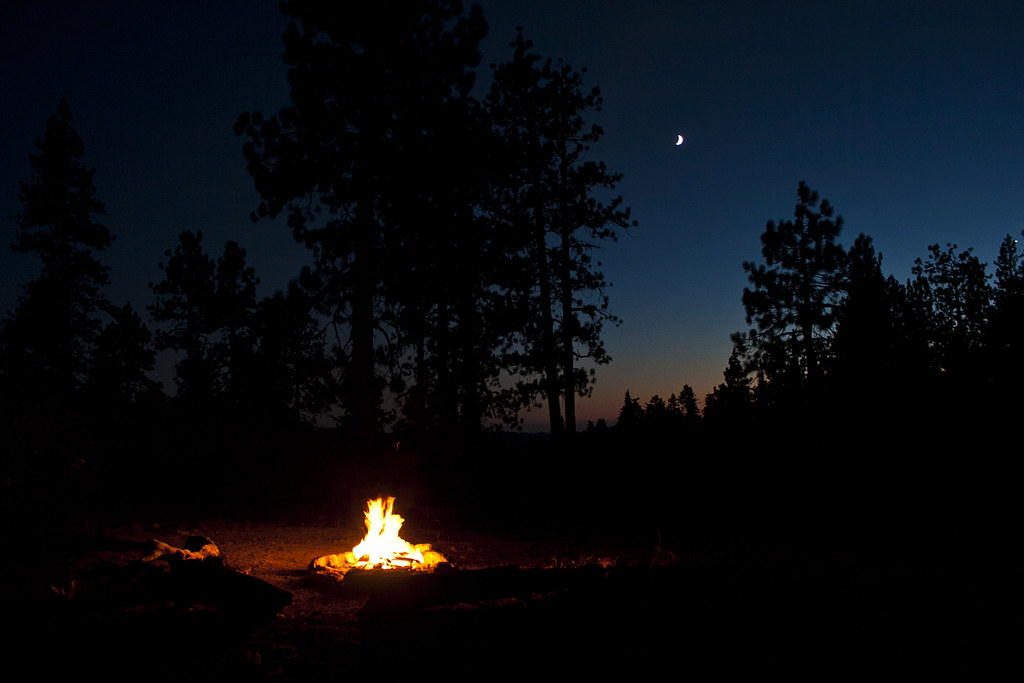 I grabbed my book, kicked off my shoes and socks, then sat by the fire. I leaned my back against a log. I warmed my feet by resting them upon a stone of the fire ring. The light from the fire shrunk my pupils, dimming much of the starlight, but the crescent moon still beamed brilliant. Moments like these make all the effort worthwhile.
I grabbed my book, kicked off my shoes and socks, then sat by the fire. I leaned my back against a log. I warmed my feet by resting them upon a stone of the fire ring. The light from the fire shrunk my pupils, dimming much of the starlight, but the crescent moon still beamed brilliant. Moments like these make all the effort worthwhile.
I let the fire burn down to reduce the light, so I could see more of the stars. I lay on my back with interlaced fingers behind my head. I reveled in that feeling of getting dirty, but not caring. A log popped, sending ember and ash fireworks into the sky to join the starlight for a brief moment before winking out.
As my pupils dilated, the Milky Way came back into view. When is the last time you went somewhere you could see it shining so brightly? I took three planes, two buses, and a train, climbed over miles of rockslides and traversed a dangerously unstable scree slope.
And it was absolutely worth it.
Part 5 >
After stepping from one boulder to another, my camera was unleashed from the cord holding it against my pack’s shoulder strap. It swung from the strap around my neck and banged into my arm. I watched my lens cap pop off and fall between a pile of large stones and out of sight. For a moment, the gentle breeze was accompanied by hushed expletives.

I had no intentions of leaving the only lens I brought unprotected. I laid face down over one of the boulders, so I could reach for the lens cap. “No snakes, no snakes, no snakes,” I willed as I blindly stretched my arm in. When it comes to things I want to avoid on a solo backpacking trip, not taking photos rates only slightly worse than a venomous snake bite. Luckily, I felt the cap instantly and retrieved it. I blew off the dirt, secured it to my camera, and devised a way to make sure that would not happen again.
After traversing the final rockslide, the trail dead-ended into a thicket of trees, shrubs, and thorned bushes. I looked up a scree slope to my right. A scree slope is an accumulation of broken rock fragments sometimes found at the base of mountains and cliffs. The pieces ranged in size from coarse sand to pea gravel, mixed with larger jagged rocks.
“It’s not that bad, only about sixty feet,” the ranger said this morning regarding how far I'd need to climb to reconnect with the trail. He didn’t say it was a scree slope, but this had to be it. I put my camera in my pack. I didn’t get photos of this area, but I would need to bushwhack and use all fours to make it up.
With every two or three feet I went up, I slid down one, like climbing a mound of gravel at a quarry. About a quarter of the way up, it got much steeper. Disturbing images of falling down the hill and rolling over jagged shards of granite, entered my mind, followed by the desperate descent back to civilization that would follow. I stopped to look for cairns, flat stacked rocks that mark a trail. The ranger said I would see some. I saw nothing; no trail, no road, no cairns. I eased back to the bottom, mostly by sliding on my butt.
I paced back and forth along the trail looking for a safer way up. At the dead-end's side of the scree slop there was foliage growing through the gravel. I worked my way up grabbing shrubs and thorn bushes for support. I got further than before, but got stopped at another obstacle that seemed too risky, considering the ranger’s insistence that it wouldn't be that difficult. I was getting frustrated. I went back down for one last futile attempt to find cairns, but gave up and went back the way I just came.
Every move was cautiously considered. I grabbed rock ledges with nervous, sweaty hands. My knuckles turned white when gripping plant stems and tree branches. Trekking poles were nearly useless in the gravel, but worked well when holding them horizontally behind a pair of tree trunks and grasping them like ladder rungs. At this point, it was more dangerous to turn back than it was to go forward, so I pressed on.
I chose my route based on the next thing I could grab. This inadvertently led me to an area on the hill that, if I were to fall and slide to the bottom, would give me a few hundred foot free fall to look forward to. My rising blood pressure swelled the ugly veins on my forehead. Each footstep sent pebbles rolling down the hill. I heard them falling over the edge. Then falling. Then falling. A rather disturbing sound.
I spotted Manzanita shrubs up ahead. I sold Manzanita branches in my pet store for parrot perches and recognized their smooth twisting trunks and branches instantly. The wood is too hard for large parrots to easily destroy with their powerful beaks. I never thought that information would come in handy again, especially for this reason.
 I crawled on hands and knees while grasping them for support. They were indeed strong enough. Their contorted branches scratched red lines into my face and arms, but I didn’t care dammit, I was getting up this hill!
I crawled on hands and knees while grasping them for support. They were indeed strong enough. Their contorted branches scratched red lines into my face and arms, but I didn’t care dammit, I was getting up this hill!
The lower branches pushed at my forty pound humpback and forced me to lay flat to finish my climb. I felt like I was in boot camp crawling under barbed wire, only I was on a gravely hill that ended with a deadly drop.
I want to believe that in a parallel universe, there is a Ryan that didn’t open a pet store, a smarter Ryan perhaps, but nonetheless a Ryan with no knowledge of the tensile strength of the Manzanita branches. Maybe this other Ryan would have chosen a different path up this hill and fell to his death. I want to believe that because it would validate my decision to waste my early to mid-twenties running a pet store.
Wishful thinking maybe, but after spending four years cleaning animal shit every day, who wouldn’t want to believe that it would one day save their life in Yosemite National Park?
While still crawling on the ground, grasping at the branches, I looked up and saw a rock wall that had once supported a side of the old road. I was able to get to my feet, over the wall, and back on track. It was easily the most nerve-racking moment I’ve ever had on a hike, but I made it. I wanted to get on hands and knees to kiss the trail, French kiss it even. I was that happy. But instead, I took off my pack and had lunch.
The road was more intact up here. A long section curved into a tunnel of trees, without a single rockslide blocking my path. The traffic has been gone for decades, but I imagined the road in its glory days. Open carriages and Model Ts coming around the bend, passengers leaning out to point at the view. For some reason, I could only imagine this in black-and-white, running at the wrong speed, and accompanied by honky-tonk piano music.
Fade to today and it’s a dilapidated overgrown stretch of road, no longer on maps. A man is sitting alone in the middle of it, crunching on crackers and turkey pepperoni, minding his own business.
Somewhere in the trees, a branch cracked. I turned to see what it was. The leaves rustled. The heavy footsteps of a large animal fled into the woods, fracturing more sticks as it ran. I didn’t see anything, but I thought it sounded more like a bear than a deer.
 “Rainy days and Monday’s allll-ways get me-eee dowwwwn!” Probably too late for that, but I sang the chorus anyway, and made myself laugh out loud.
“Rainy days and Monday’s allll-ways get me-eee dowwwwn!” Probably too late for that, but I sang the chorus anyway, and made myself laugh out loud.
It wasn’t until I stopped for water that I realized there wasn’t much daylight left. I searched for a good place to setup camp while I hiked up another mile. The trail curled around a hill that I suspected would have a good place to setup camp on top. I wore myself out rushing uphill to secure my place to sleep before nightfall.
The top was a rocky plateau with few trees, perfect for viewing the stars. A scorched ring of stones lay in the middle for a fire. I slid out of my backpack and stretched my shoulders. After removing that burdensome weight, the feeling in my legs gives me a sense that I could jump on top of buildings. I leaped into the air, probably twelve inches off the ground, but for a brief moment felt like Superman.
I surveyed the area and chose a place to pitch my tent. I moved a few sticks, logs, and dry pine needles next to the fire ring to use later. Within a few minutes I had fire crackling and ate a small meal. The sun, that I thought would be gone before I setup camp, seemed to wait until I was finished before heading in for the night. The Milky Way splashed a celestial river across the dark sky.
The sky at Yosemite isn’t the darkest I’ve seen (that award still goes to Isle Royale), but sixty percent of Americans can’t even see the Milky Way due to light pollution. I gazed at the sky and wondered why we bother to light up the night. Especially in small towns, like back home, that more or less close by 6 PM. The night lights have not been shown to reduce crime, nor have they been as effective at reducing car accidents as reflective lane markers. My assumption for why we do this reminded me of something I mentioned before.
“But, what about bears?” Maybe it’s just another irrational fear. Nyctophobia, fear of the dark. I'm certainly not without my own fears, but I’m convinced that an important first step to living an interesting life is learning to accurately assess risk. If nothing else, maybe doing so will convince us to bring back one of the most beautiful things any of us will ever see: a truly dark sky.
 I grabbed my book, kicked off my shoes and socks, then sat by the fire. I leaned my back against a log. I warmed my feet by resting them upon a stone of the fire ring. The light from the fire shrunk my pupils, dimming much of the starlight, but the crescent moon still beamed brilliant. Moments like these make all the effort worthwhile.
I grabbed my book, kicked off my shoes and socks, then sat by the fire. I leaned my back against a log. I warmed my feet by resting them upon a stone of the fire ring. The light from the fire shrunk my pupils, dimming much of the starlight, but the crescent moon still beamed brilliant. Moments like these make all the effort worthwhile.
I let the fire burn down to reduce the light, so I could see more of the stars. I lay on my back with interlaced fingers behind my head. I reveled in that feeling of getting dirty, but not caring. A log popped, sending ember and ash fireworks into the sky to join the starlight for a brief moment before winking out.
As my pupils dilated, the Milky Way came back into view. When is the last time you went somewhere you could see it shining so brightly? I took three planes, two buses, and a train, climbed over miles of rockslides and traversed a dangerously unstable scree slope.
And it was absolutely worth it.

A Backpacker's Life List by Ryan Grayson is licensed under a
Creative Commons Attribution-NonCommercial-NoDerivs 3.0 Unported License.
